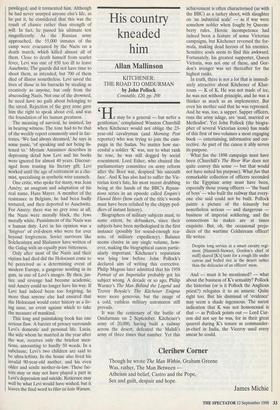His country kneaded him
Allan Mallinson
KITCHENER: THE ROAD TO OMDURMAN by John Pollock Constable, £20, pp. 290 He may be a general — but neer a gentleman,' complained Winston Churchill when Kitchener would not oblige the 23- year-old cavalryman (and Morning Post reporter) who was trying to join the cam- paign in the Sudan. No matter how suc- cessful a soldier 'IC' was, nor to what rank he rose, he was still dogged by social resentment. Lord Esher, who chaired the parliamentary committee on army reform after the Boer war, despised 'his uncouth face'. And K has also had to suffer the Vic- torian icon's fate, his most recent drubbing being at the hands of the BBC's Reputa- tions series in an episode called Empire's Flawed Hero (how each of the title's words must have been relished by the chippy ped- dlers of instant history).
Biographers of military subjects must, to some extent, be debunkers, since their subjects have been mythologised in the first instance (possibly for sound-enough rea- sons of military expediency). Balance seems elusive in any single volume, how- ever, making the biographical canon partic- ularly important. Kitchener's reputation was lying low before John Pollock's declared aim of writing this corrective. Philip Magnus later admitted that his 1958 Portrait of an Imperialist probably got his subject wrong. A decade or so ago, Philip Warner's The Man Behind the Legend and Trevor Royale's The Kitchener Enigma were more generous, but the image of a cold, ruthless military automaton still prevails.
It was the centenary of the battle of Omdurman on 2 September. Kitchener's army of 20,000, having built a railway across the desert, defeated the Mahdi's army of three times that number. Yet this achievement is often characterised (as with the BBC) as a turkey shoot, with slaughter on 'an industrial scale' — as if war were somehow nobler when fought by Queens- berry rules. Heroic incompetence had indeed been a feature of some Victorian campaigns, but Kitchener reversed the for- mula, making dead heroes of his enemies. Sensitive souls seem to find this awkward. Fortunately, his greatest supporter, Queen Victoria, was not one of these, and Gor- don's avenger was set thereafter for the highest ranks.
In truth, there is not a lot that is immedi- ately attractive about Kitchener of Khar- toum — K of K. He was not made of ice, he was not without principle, and he was a thinker as much as an implementer. But even his mother said that he was repressed. And he was, too, a sapper. Sapper officers, runs the army adage, are 'mad, married or Methodist'. Yet John Pollock (the biogra- pher of several Victorian icons) has made of this first of two volumes a most engaging book — entertaining, informative and cor- rective. As part of the canon it ably serves its purpose.
What fun the 1898 campaign must have been (Churchill's The River War does not quite convey this sense — but that would not have suited his purpose). What fun that remarkable collection of officers seconded to the Egyptian army must have been, especially those young officers — 'the band of boys' — who built the railway that every- one else said could not be built. Pollock paints a picture of the leisurely but nonetheless serious — and dangerous — business of imperial soldiering, and the connections he makes are at times exquisite. But, oh, the occasional preju- dices of the wartime Coldstream officer! He writes:
Despite long service in a smart cavahy regi- ment [Hammill-Stewart, Gordon's chief of staff] shared [K's] taste for a rough life under canvas and boiled rice in the desert rather than the delicacies of an officers' mess.
And — must it be mentioned? — what about the business of K's sexuality? Pollock the historian (or is it Pollock the Anglican priest?) relegates it to an annexe. Quite right too. But his dismissal of 'evidence' may seem a shade ingenuous. The surest indication that K was not homosexual is that — as Pollock points out — Lord Cur- zon did not say he was, for in their great quarrel during K's tenure as commander- in-chief in India, the Viceroy used every smear he could.


































































 Previous page
Previous page